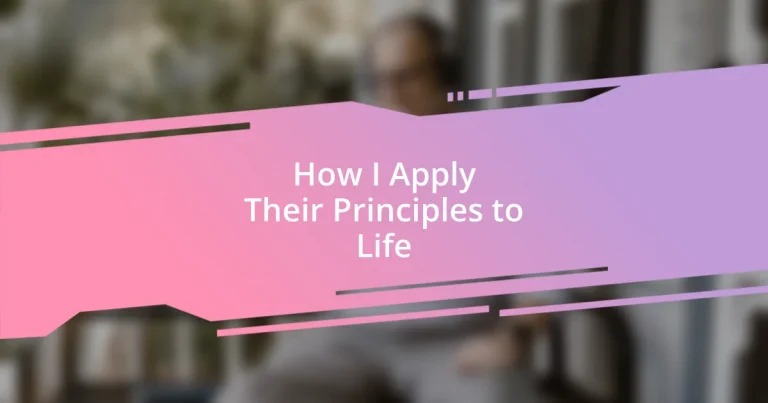Key takeaways:
- Understanding and revisiting core principles can provide clarity and direction during challenging times.
- Creating specific, measurable, and achievable goals helps transform aspirations into actionable plans.
- Reflecting on experiences fosters personal growth by identifying lessons learned and sharing insights with others.
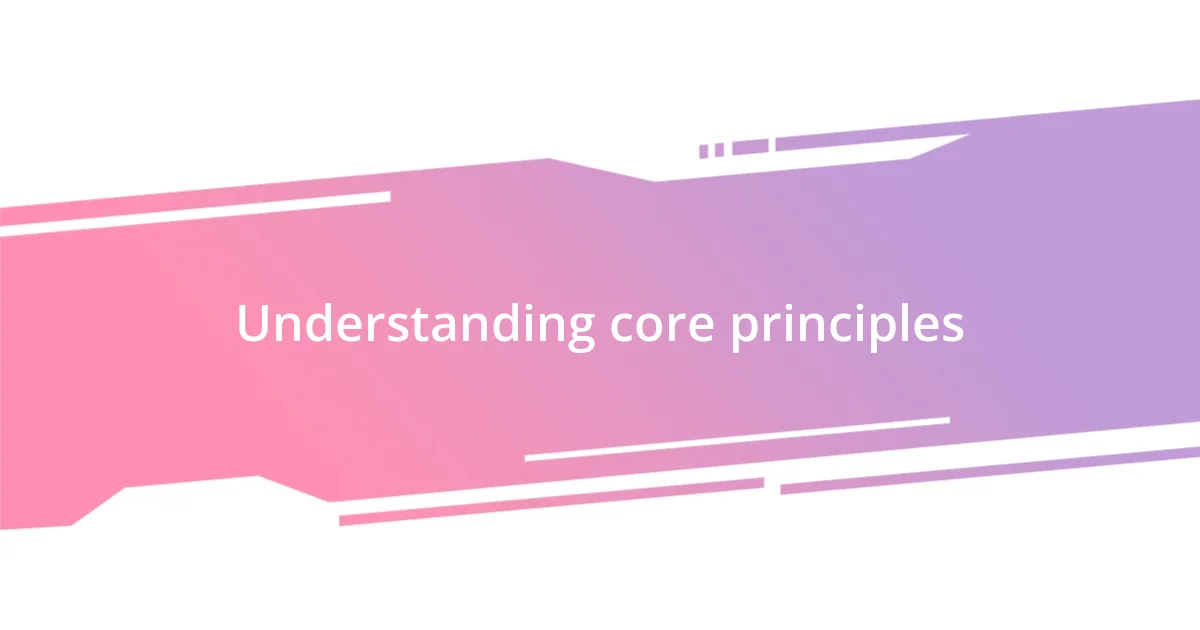
Understanding core principles
Understanding core principles is essential for personal growth. I remember a time in my career when I faced a tough decision. I chose to revisit the values that guided me, and it made all the difference. Isn’t it fascinating how grounding yourself in what you truly believe can lead to clarity in confusion?
Often, I find that core principles act as a compass in our lives. For instance, when I faced setbacks, reminding myself of my dedication to perseverance helped me push through. Have you ever noticed how returning to your guiding principles can reinvigorate your passion?
It’s almost like having a personal manifesto tucked away for those challenging moments. When my friend was feeling lost, we went through her core values together, and she discovered a renewed sense of direction. Isn’t it incredible how understanding our own principles can spark transformation, prompting us to take actionable steps towards our goals?
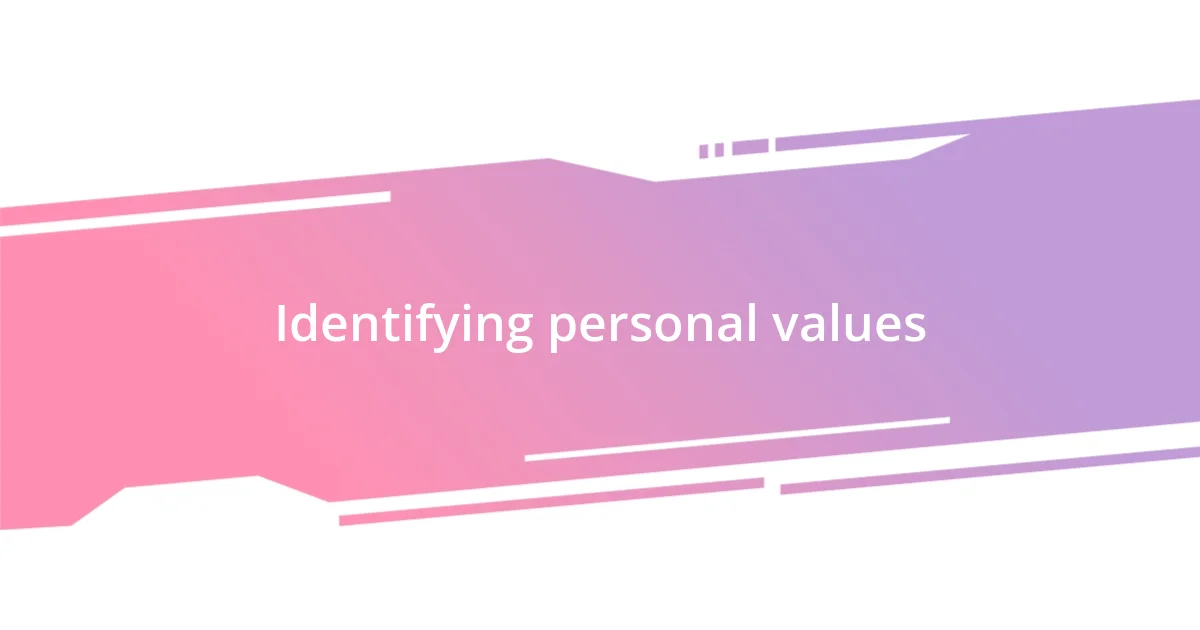
Identifying personal values
Identifying personal values is a journey of self-discovery that can sometimes feel overwhelming. I remember sitting down with a journal one evening, reflecting on experiences that shaped me. As I listed what truly mattered—like honesty, empathy, and growth—I felt a sense of liberation. It was exhilarating to realize how these core beliefs were not just words, but guiding principles that influence my decisions every day.
To help clarify your own values, consider these thoughtful prompts:
- What qualities do I admire in others?
- When do I feel most alive and fulfilled?
- What issues or causes resonate deeply with me?
- Are there moments I felt particularly proud or ashamed? What values were being expressed or violated then?
By immersing ourselves in these questions, I believe we can unveil the essence of who we are—and who we aspire to be. It’s a powerful exercise that can shape our paths moving forward, allowing us to align our actions with our true selves.
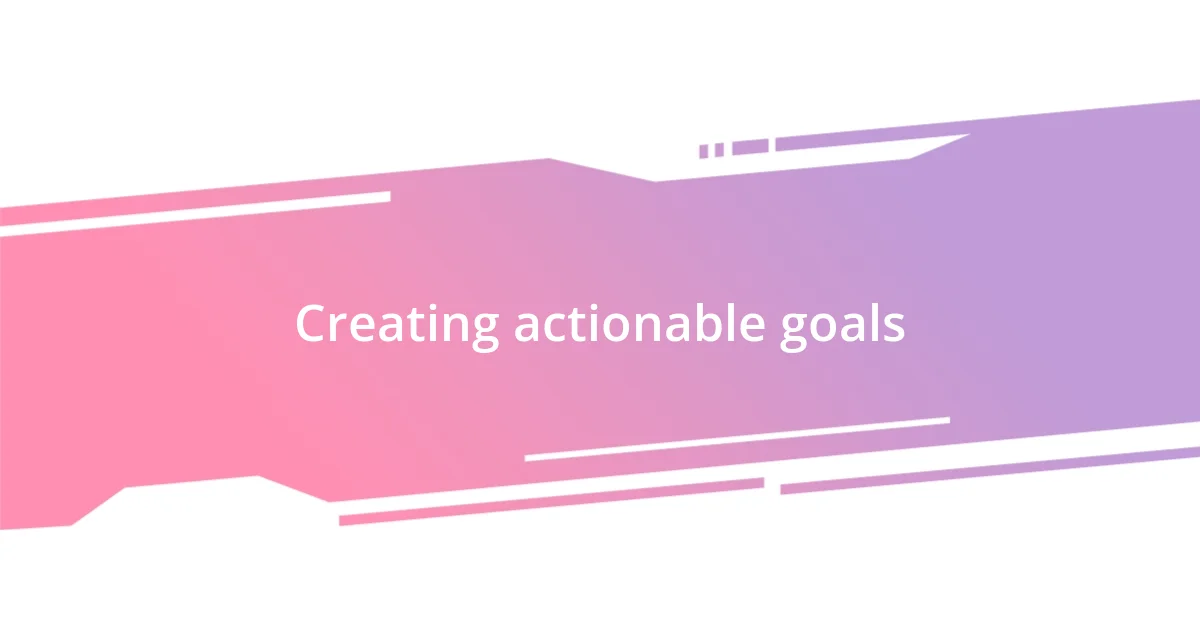
Creating actionable goals
Creating actionable goals is a critical step that often determines the success of our aspirations. I remember when I wanted to improve my fitness—just having the goal wasn’t enough. By creating specific targets, like running a 5K within a certain time frame, I turned an abstract idea into something tangible. Have you ever noticed how a clear goal can ignite motivation? The specificity transforms dreams into achievable milestones.
It’s important to break goals into smaller, actionable steps. When I decided to learn a new language, instead of just saying, “I want to be fluent,” I set aside 15 minutes each day for practice. Tracking my progress made me feel accomplished, and those tiny victories kept me engaged. Have you tried chunking down your goals like that? It’s a game changer.
Lastly, maintaining flexibility while pursuing goals is essential. Life often throws curveballs, as I experienced when I had to adjust my study schedule for an unexpected work commitment. Instead of feeling derailed, I revised my goals, making them fit into my new reality. I firmly believe that adaptability in our approach makes the journey more enjoyable and less stressful.
| Actionable Goals | Benefits |
|---|---|
| Specific | Increased focus and clarity |
| Measurable | Allows tracking of progress |
| Achievable | Boosts motivation and confidence |
| Relevant | Aligns with personal values |
| Time-bound | Creates urgency and commitment |
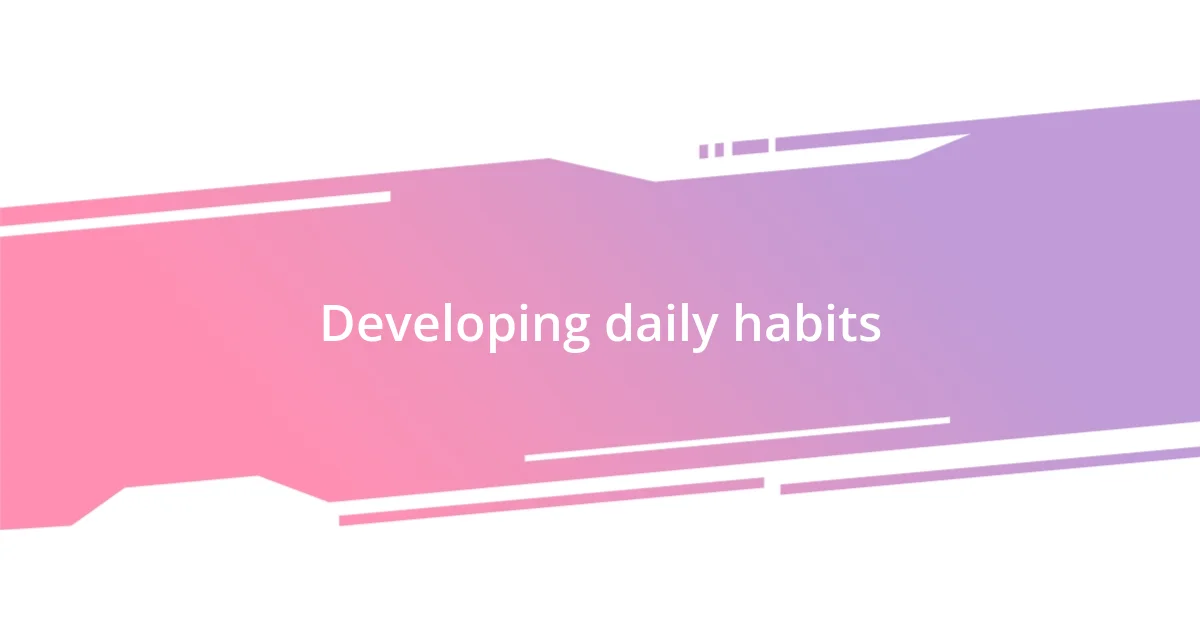
Developing daily habits
Developing daily habits is a powerful way to transform intentions into reality. I recall when I decided to incorporate gratitude into my morning routine. Each day, I spent just five minutes jotting down things I appreciated. This simple practice reshaped my outlook, making me more positive and resilient. Have you considered how small, consistent actions can shift your perspective?
When crafting my daily habits, I focus on starting small. For instance, I wanted to read more books, so I committed to just ten pages a day. It’s amazing how those few pages add up over weeks and months. Have you noticed how little efforts can yield significant results? This slow build can feel less daunting, and frankly, it makes the process enjoyable.
One pivotal realization for me was the importance of accountability. I found that sharing my goals with friends not only kept me motivated but also created a support system. When I’d falter, they were there to remind me of my aspirations. Have you thought about how community can bolster your habit-building efforts? It turns out, having allies in the journey can make a world of difference, keeping you both inspired and committed.
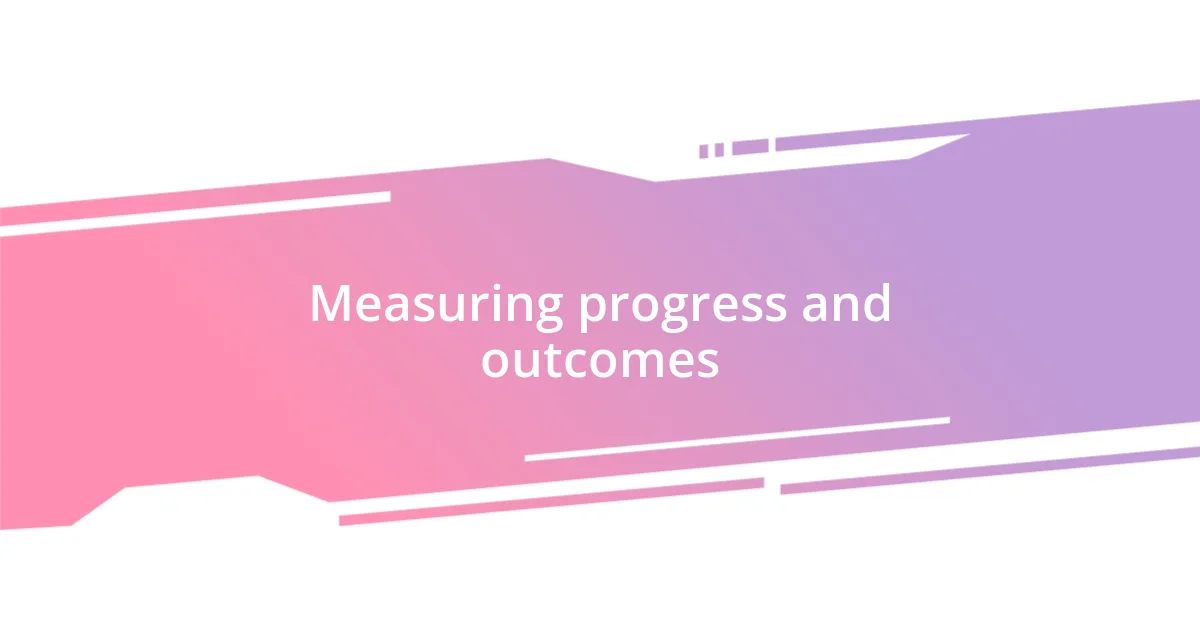
Measuring progress and outcomes
Measuring progress and outcomes is an essential part of any goal-setting process. I remember feeling a mix of excitement and anxiety when I first started tracking my fitness journey. Using a simple app, I logged my workouts, and it quickly became clear how those small changes added up over time. Have you ever felt that rush when you see numbers affirm your hard work? It’s a powerful motivator.
I also realized that measuring progress isn’t just about looking at the end result. For instance, while training for a half marathon, I began by measuring my daily running distances and times. Those numbers didn’t only represent my performance; they documented my growth. Seeing my pace improve from week to week ignited a sense of pride and encouraged me to keep pushing my limits. Isn’t it fascinating how numbers can validate our efforts and inspire further action?
Moreover, reflecting on outcomes is equally crucial. After completing projects, I like to evaluate what worked and what didn’t. For example, after a big presentation at work, I would assess my delivery and audience feedback. This reflection helps me refine my approach for future endeavors. Have you ever taken a moment to analyze your experiences? It can unveil invaluable lessons that shape your next steps, making each journey richer and more informed.
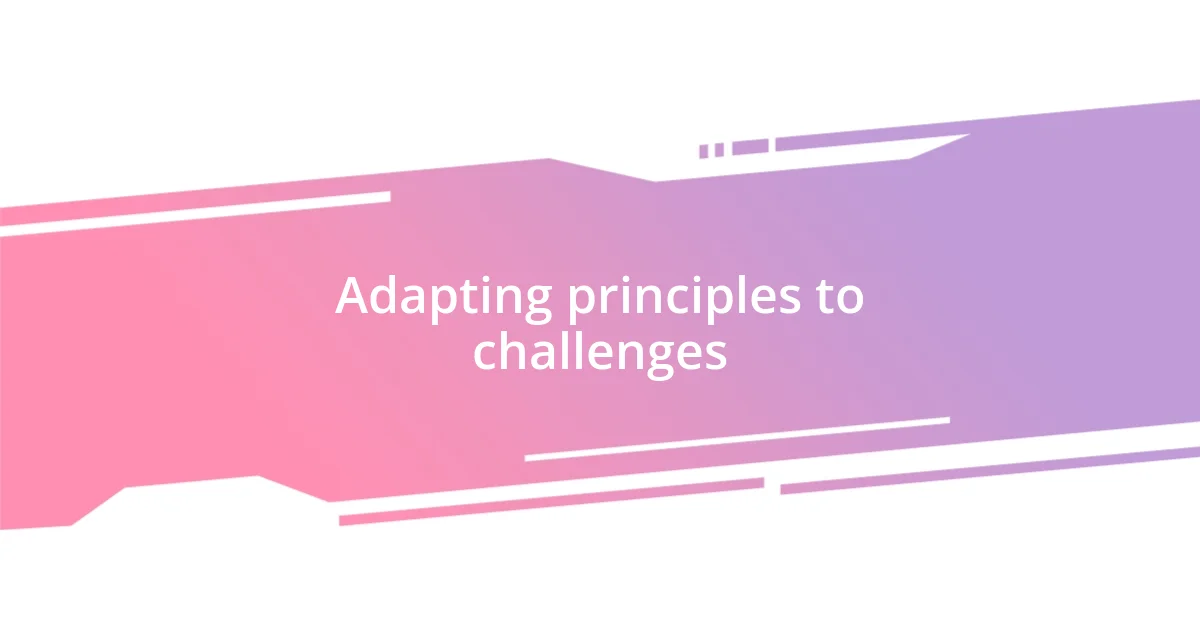
Adapting principles to challenges
Adapting principles to challenges involves a mindset shift that can be transformative. I recall a particularly challenging project at work that seemed overwhelming at first. Instead of allowing the stress to consume me, I leaned into my principle of breaking tasks into smaller steps. By tackling one manageable piece at a time, I not only completed the project but also experienced a sense of accomplishment that fueled my motivation. Have you ever faced a daunting challenge and found that a structured approach helped?
When I encountered setbacks, I learned that flexibility is key. Once, during an intense period of personal growth, I set a goal to meditate daily. But life threw unexpected curveballs my way, making consistency difficult. Instead of feeling defeated, I adapted by allowing myself to meditate whenever I could, even if it was just for a few minutes during lunch. This adaptability kept my practice alive and reminded me that commitment doesn’t always look the same; it evolves with our circumstances. Isn’t it liberating to know that you can navigate setbacks without losing sight of your goals?
Another important lesson for me has been the power of reflection. After facing significant challenges, I often take a step back to assess what I learned. For example, after a difficult negotiation, I reflected on my emotional responses and how they affected the outcome. This practice not only clarified my growth areas but also reinforced my belief in the continuous cycle of learning. How often do you pause to consider what challenges have taught you? Embracing this reflection can turn obstacles into stepping stones for future success.
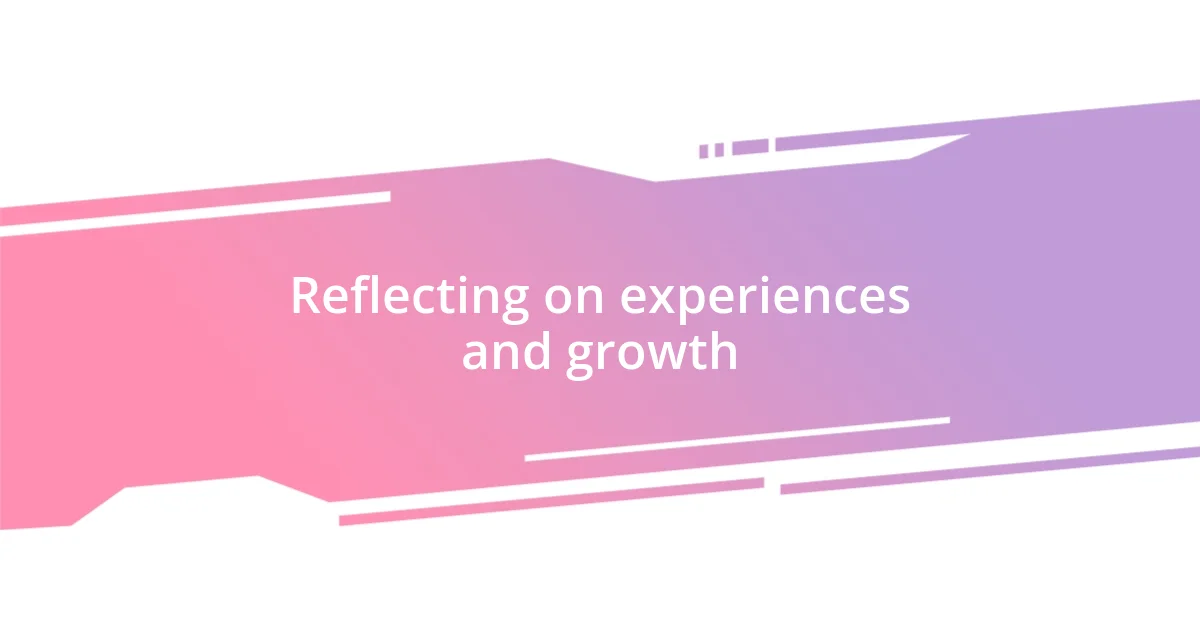
Reflecting on experiences and growth
Reflecting on my experiences has always been a cornerstone of my personal growth. I vividly recall the time I stumbled through a job interview that left me feeling frustrated and self-doubting. Instead of brushing it off, I spent the evening journaling about my performance. Analyzing each question and my responses not only helped me pinpoint my weaknesses but also showcased areas where I excelled. How often do we give ourselves the space to truly dissect moments that challenge us? It can be eye-opening.
As time progresses, I’ve come to appreciate the emotional complexities that accompany growth. After embarking on a new role, I found myself overwhelmed by the steep learning curve. Instead of succumbing to the pressure, I paused and reflected on my prior successes and setbacks. This practice helped me recognize that feeling uncomfortable was a part of growth. Have you ever felt out of your depth and realized that discomfort signals progress? Embracing those emotions turns uncertainties into stepping stones.
Equally important is how I share my reflections with others. I often discuss significant lessons with friends or mentors, which enhances my understanding and enriches my perspective. Recently, during a casual coffee chat, I recounted a failure I faced while launching a project. Hearing feedback and insights from others transformed my initial disappointment into gratitude for the learning experience. Isn’t it fascinating how sharing can amplify our reflections? It not only solidifies our growth but also creates connections that foster communal wisdom.












